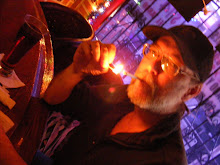The Saddest Event Of Last Year That Did Not Involve Terrorists Or Hurricanes
CHICAGO (Reuters) - The journalistic descendants of novelist Kurt Vonnegut and Pulitzer Prize-winning reporter Seymour Hersh gathered at one of Chicago's venerable watering holes on New Year's Eve to mourn the loss of another storied institution. City News, a just-the-facts wire service that covered Chicago's cops and courts 24 hours a day, seven days a week for more than 100 years, was about to file its last story on Saturday night. As they waited for the bulletin to appear, more than 100 current and former City News staffers crowded into the Billy Goat Tavern, a nearby bar popular with journalists ever since it opened in 1934, one year after Prohibition ended.
Yellow crime-scene tape hung from the Billy Goat's ceiling, substituting for black crepe. Against the wall, the mourners draped a banner bearing the wire's hard-bitten motto: "If your mother says she loves you, check it out."
The shuttering of City News comes as the newspaper industry grapples with the challenges posed by the Internet, which has transformed the way consumers get information and turned upstarts like Google Inc. into feared rivals. Indeed, the Tribune Co., the wire's owner and publisher of the Chicago Tribune, said it was closing the wire and laying off its 19 employees, in part because competitors were using it to get news to readers hours before the Tribune published its paper editions. For many Chicagoans, the closure represented another blow to a city still reeling from news that two cherished downtown landmarks -- the Marshall Field's department store and The Berghoff restaurant -- were going away.
But if dry throats were hard to find on Saturday night at the vigil, dry cheeks abounded. That's because City News, which began in 1890 as a way for eight local newspapers to cover the city on the cheap, was, as more than one ex-staffer put it, a good place to be from -- not a good place to be. It made reporters out of young men and women by pushing them relentlessly, often forcing them to go back to sources and get precise details -- the color of the dead baby's eyes or of a corpse's socks -- that rarely seemed to advance a story.
"The happiest days of your life are the day you get hired by City News and the day you quit," said J. Patrick Connelly, a Chicago attorney who worked there in 1981 and 1982.
But the process worked, churning out some famous writers -- Vonnegut, Hersh and Chicago columnist Mike Royko among them -- and many more skilled journalists like James Furlong, who toiled at City News in 1957 and 1958 and went on to work at news agencies around the world. Over the years, City News broke big stories including the capsizing of the S.S. Eastland in the Chicago River in 1915, the St. Valentine's Day Massacre in 1929, and the death of Harold Washington, the city's first black mayor, in 1987. Furlong, one of six family members hired by City News since the 1920s, traveled 900 miles from his home in Mystic, Connecticut, to attend the wake.
"Beats watching the ball drop in Times Square," he said.
Even as bureau chief Paul Zimbrakos left the Billy Goat around 11 p.m. to send out the last story, there was talk that City News might be revived -- as it was in 1999, after the Tribune and then co-owner the Chicago Sun-Times briefly shuttered it. But this time there was no reprieve. City News was pronounced dead around 11:30 p.m. after it moved its final story, an obituary of itself.
Then Zimbrakos, who joined City News in 1958 and never left, turned to the group and said simply, "Let's get out of here, I'm thirsty."

